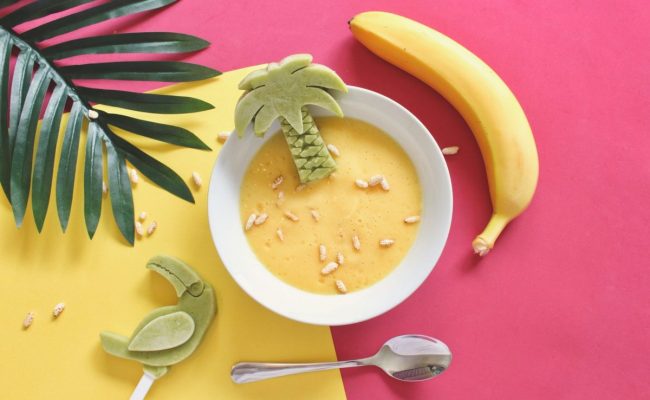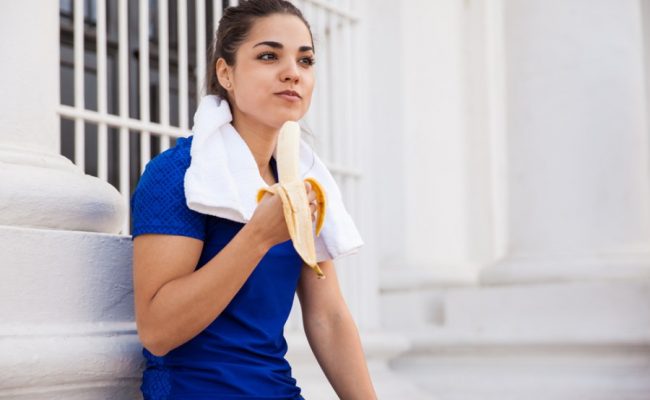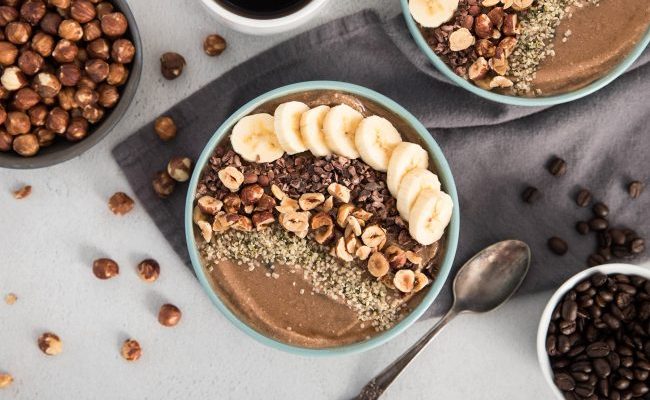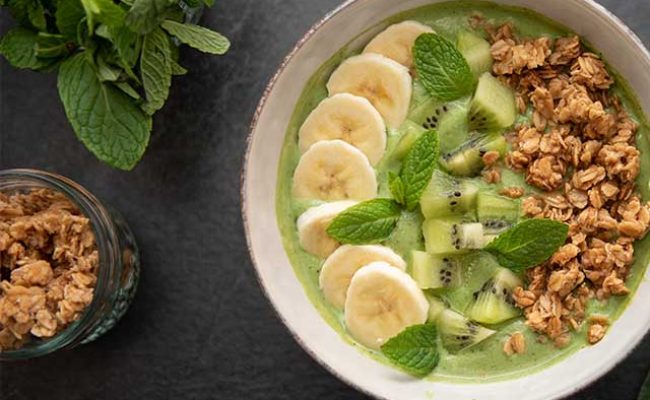Banana: Nutrition Facts/ 1 banana

1 medium banana 120 gr. peeled (length unpeeled 7-7/8”)
Carbs
26.9 gr
10.8%
Sugars
14.4 gr
28.8 %
Fiber
3.07 gr
12.3 %
Protein
1.29gr
0.9%
Total Fat
0.39 gr
0.9%
Macros Ratio
Energy /1 banana 🍌
Daily Coverage for diet 2000kcal *
Calories
105 kcal
5.3 %
Vitamins, Minerals & Trace elements / 1 banana
Vitamin B6 🚹 🚺
0.433 mg
33.3 %
Manganese Women🚺
0.319mg
17.7 %
Manganese Men🚹
0.319 mg
13.9 %
Vitamin C Women🚺
10.9 mg
13.7 %
Vitamin C Men🚹
10.9 mg
11.4 %
Magnesium Women 🚺
31.9 mg
10 %
Pantothenic Acid - B5 🚹 🚺
0.394 mg
7.9 %
Riboflavin-B2 Women 🚺
0.086 mg
7.8 %
Magnesium Men 🚹
31.9 mg
7.6 %
Riboflavin (B2) Men 🚹
0.086 mg
6.6 %
Folic Acid-B9
23.6 μg
5.9 %
Why is banana the number 1 fruit in the world?

Banana is the number 1 fruit in production and consumption worldwide and not by chance. Banana seems to be nature’s perfect sports snack. It is easily transported, opened, and consumed thanks to its practical ecological “packaging”, it is an ideal source of complex and simple carbohydrates, low in calories, and very nutritious as it contains vitamins, minerals, trace elements, and beneficial phytochemicals. Another factor that makes the banana stand out from other fruits is the fact that it is digestible, soft and suitable for special diets eg infants, the elderly, people with gastrointestinal problems. Finally, the banana, although an exotic fruit, can be easily transported and preserved, reaching us intact at an affordable price.
Health benefits of banana

Banana is rich in vitamins, minerals and trace elements
A medium banana contains important vitamins of the B complex (B6, B3, B1, B5, B2) , potassium, manganese , vitamin C, magnesium , folic acid phosphorus and even more in smaller quantities ... A banana covers 50% of our needs for Vitamin B3 (Niacin) which helps in glucose metabolism , fat and cellular energy production.

Banana is an ideal snack before and after training
Before a workout, carbohydrates and sugars are an ideal source of energy, while B-complex vitamins, which are involved in metabolism and energy production, give an extra boost to our workout. Bananas can also be eaten after a workout as sugars and carbohydrates will help the muscles to "refill" glycogen while its content of magnesium, potassium, vitamin C and other bioactive ingredients have a beneficial effect on muscle recovery and growth.

It has antioxidant properties
Banana is full of bioactive phytochemicals of phenolic compounds that act as antioxidants, binding free radicals and protecting the body from aging and diseases. Some phenolic compounds contained in banana are: gallic acid, catechin, epicatechin, tannins and anthocyanins, gallocatechin, epigallocatechin, quercetin, myricetin, caemberol, ferulic, mustard, salicylic, gallic, p-hydroxybenzoate, cyanate, vanillic

Banana is rich in carotenoids (pre-Vitamin A)
Bananas contain carotenoids (pre-Vitamin A) to help fight vitamin A deficiency. Carotenoids also act as antioxidants, reducing the risk of certain cancers, heart problems and eye diseases while at the same time stimulating the immune system. Some carotenoids in bananas are: lutein, β-carotene, α-carotene, biolaxanthin, auroxanthin, neoxanthin, isolutein, β-cryptoxanthin and α-cryptoxanthin

Contains biogenic amines that act beneficially on the nervous system
Bananas, among others, contain serotonin, dopamine and norepinephrine, compounds that: Contribute to feelings of well-being and happiness, play an important role in the human brain and body as neurotransmitters with great impact on our mood, ability to concentrate and emotional stability, reduce oxidative stress in plasma and enhance resistance to oxidative modification of fat density.

Contains phytosterols that lower cholesterol
Banana contains phytosterols that reduce the level of cholesterol in the blood and its absorption in the intestine. Phytosterols act as regulators of the immune system and also have anti-cancer properties.
Some of the phytosterols contained in bananas are:
cyclohecalenone, cyclohecalenol, cyclohartenol, stigmasterol, campesterol and β-sitosterol
Is it true that bananas can make you gain weight?

Banana, like all fruits, is high in sugar. For this reason alone, any sensible person would expect bananas to cause weight gain or not to be allowed on diet. Hundreds of studies, however, come to highlight the paradox of fruits….Years of research and studies in real people concluded that fruits help fight obesity, boost weight loss and have multiple benefits to our health.
The reasons for this scientific paradox have been summarized by scientists as follows:
- Fruits are rich in vitamins, minerals, and trace elements
- They have a high content of fiber and water that cause satiety
- They contain phytochemicals that are involved in the complex mechanisms of metabolism, fighting oxidative stress and suppressing lipogenesis
- They transform the intestinal microflora
- There are still unknown mechanisms that scientists are trying to discover
This means that bananas not only won’t make us gain weight but are our ally in a healthy diet and help us maintain a healthy metabolism and a normal weight.
Read the full article to the paradox of fruit in weight loss here.
Sources & References
- Rinah K. Netshiheni, Adewale O. Omolola, Tonna A. Anyasi and Afam I.O. Jideani (October 9th 2019). Banana Bioactives: Absorption, Utilisation and Health Benefits, Banana Nutrition - Function and Processing Kinetics, Afam I. O. Jideani and Tonna A. Anyasi, IntechOpen, DOI: 10.5772/intechopen.83369. Available from: https://www.intechopen.com/chapters/69451
- Bananas -The nutrition Source, Harvard TH Chan, School of Public Health
